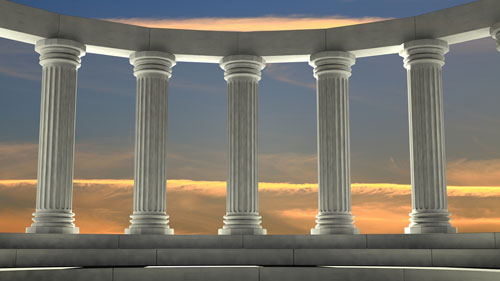
(Karra deals with the problems of long-term techniques for storing water so no air gets to it that would allow mold to form. As a bonus we learn of the Sirian Defense Force's way of purifying water much in a way halazone works. We also get a lesson on the storage of gas for emergencies where it may be needed years later.)
Russ: now the question I have for you was on the water purification wise.
Karra: uh-huh.
Russ: we're thinking on some kind of storage unit.....
Karra: uh-huh.
Russ: is that still an optional thing that we can work with?
Karra: I'm having difficulty with some of your ideas for storage vessels. One of the things that is very important is that no air gets into the storage vessel because that's when the chemical reaction happens and you get stagnant. If it's a sealed unit that's totally sealed with no air that got in, that will work but some of the ideas that we've had as I said at the time they're a little weak to work with.
Russ: hmm.
Skip: you mean for the storage of water?
Karra: uh-huh, got to be totally airtight with no air in them whatsoever.
Skip: well darling, question.
Karra: uh-huh.
Skip: are you familiar with what the military developed years ago and they call them halazone tablets?
Karra: not my department I'm afraid. Sounds like some kind of engineering problem.
Skip: no, it's a tablet you drop in water and it purifies the water.......
Karra: oh.
Skip: okay? It's a chemical but I believe the basis of it is chlorine.
Karra: oh Tisk.
Skip: so it purifies any water so you can drink it.
Karra: sounds like Tisk.
Skip: sounds like what?
Karra: it's a capsule that we pour into water that purifies it when we're in the field.
Skip: yeah well that's what these were developed for is in the field.
Russ: what's the harmful effects to the body, side effects wise?
Skip: halazone? Not one, not one.
Laura: I believe what it is...
Skip: I'm sorry.
Laura: sorry, I believe what is that you're discussing is based in chlorine bleach that we commonly use but what it does is adds an extra molecule or two, I believe it's two of oxygen and prevents germ growth, bacterial growth.
Karra: yeah, very similar to what ours does. Tisk is a little powder that you pour into vats of water. It's only a tiny, little amount that you pour in and it distributes between the molecules of the water and I'm not quite sure of the chemical reaction, I slept through that in class.
Skip: may I interrupt you just a little bit darling?
Karra: yeah sure,
Karra: the halazone tablets that we got issued in the service is about the same size of an aspirin for a canteen of water. You just dropped it in. You could take water out of a stagnant pool and drop in a halazone tablet and drink it. Of course it tasted like *%^# but you could drink it and it wouldn't hurt you.
Laura: it's an ozone oxygenator I believe.
Russ: so no moss or algae or anything forms period?
Skip: none.
Russ: so what kind of container would be the best for that, steel, ceramic, wood?
Skip: I would say steel, plastic lined.
Karra: yeah, yeah, that would work.
Skip: because steel is not going to....plastic breaths. I don't care what it is, plastic breaths okay? And if it breaths, that means you're allowing air from the outside in and your algae can grow. Steel can't breathe but by lining it with plastic, even if you put a plastic bag inside of it, once you seal it, it's sealed, nothings going to get in.
Karra: and that's very, very important. That's what's been giving me the big concerns. Skip's given us the keys.
Skip: I'm sorry?
Karra: you've given us the keys that we need.
Skip: okay.
Russ: hmm.
Skip: I would suggest, now this is just a suggestion, I would suggest open top drums that the lid has got a rubber seal and when you put it down and put the band around it it seals airtight.
Karra: in fact, the best way would be to fill it so that it reaches the point where it's actually overflowing when you put it on.
Skip: yeah and it squishes the water out when you put the lid on.
Karra: yeah, which means the air is not getting trapped.
Skip: there you go.
Russ: that would work, excellent.
Karra: yeah, because that's my biggest concern is the air getting in there and the chemical reaction that can occur.
Skip: and once you open them, you go through 55 gallons of water in very short time. Because......okay I'll tell you, let me give you a for instance. In my camping trailer, I've got two 30 gallon tanks in there that I can fill with water. They run out before the week runs out. So that's actually over 60 gallons of water we use in a week's time.
Russ: but what are using it for, drinking, washing dishes, showers?
Skip: no, we don't shower, we don't shower. It flushes the pot, doing dishes which done once every two days, drinking and cooking with it and that's it.
Russ: good.
Skip: so that gives you kind of a rule of thumb to work with. Am I right or wrong darling?
Karra: you sound right. (To Laura) take a deep breath, go...does that feel a little better?
Laura: yes.
Karra: I thought so.
Russ: okay another thing we're working on is a generator.
Karra: generator, you'll have to ask Kiri about that as long as she can keep from strangling Daniel at the moment (Leonedies).
Russ: okay.
(Skip laughs)
Laura: where's the petrol going to come from for the generator?
Russ: storing.
Karra: got some problems there.
Laura: gasoline's unstable.
Russ: how about diesel?
Skip: okay, your new gasoline's you don't have problems storing it, there is no lacquers in it, there's no lead in it. Unleaded gasoline is clear and you can use it in gas stoves, you can use in lanterns, you can use it in engines, it's what we used call white gas when I was a kid because there was no lead in it. Now they've taken the lead out of gasoline, gasoline will store for up to about five years without varnishes.
Russ: excellent, that'll work fine.
Skip: yeah and if you want to store it longer than that, there is a chemical that you can pour in it that the varnishes will never form.
Laura: yeah stabilizers.
Russ: okay, I think five years would be more than adequate though.
Skip: oh yes definitely. Well you can store....well stop and figure out Russ, people store snowblowers over the summer and fire them up in the winter.
Karra: and boats over the winter and fire them up in the summer.
Skip: that's correct, lawnmowers and gasoline doesn't form any varnishes anymore.
Russ: okay good.
Skip: the lead was what was building the varnish.
Russ: well thank you Karra.
Karra: no problem, no problem. I've done my point for little bit.
Skip: thank you darling.
Karra: oh you're welcome, you're welcome.
